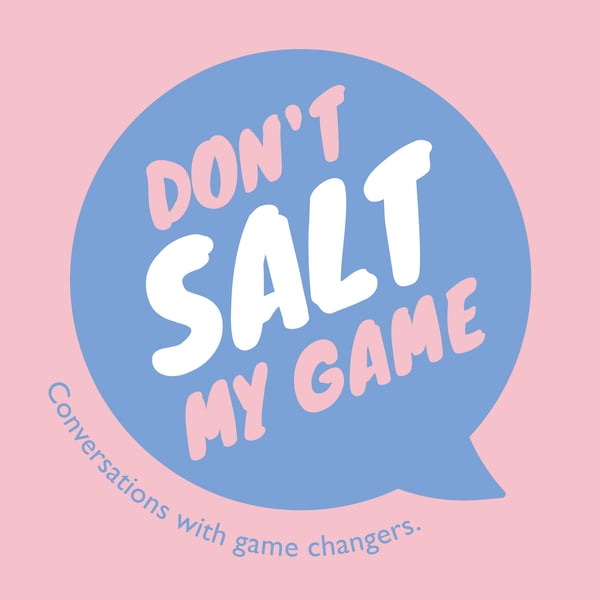Ep. 125 How To Just Eat It: Chapter 5 - Understanding Emotional Eating
Don't Salt My Game | With Laura Thomas, PhD
Laura Thomas
4.8 • 807 Ratings
🗓️ 19 January 2021
⏱️ 44 minutes
🧾️ Download transcript
Summary
Welcome to this special series of Don’t Salt My Game celebrating the release of my new book How to Just Eat It. For the next several weeks, I’ll be posting two new episodes of the podcast (Tuesdays and Fridays) that correspond with a chapter of the book to help you take your learning further and deepen your intuitive eating practice. How To Just Eat It is out now! Episode 6 of this series will drop on Friday 22nd Jan!
In today’s episode I’m talking to Jess Sprengle, a therapist specialising in disordered eating and eating disorders, who is perhaps best known for her Meme Mondays on her Instagram account @thecrankytherapist. In this episode we’re talking about emotional eating and how we can come to understand it from a more compassionate perspective.
In this episode we talk about:
- An eating disorder therapist’s take on emotional eating
- Why we can’t divorce our emotions from eating
- Differentiating emotional hunger and hunger due to restriction of food
- How restriction can show up in different areas of our lives
- Tapping into our emotional coping toolkit (and how to reinforce the one we already have)
- And loads more mic drop moments!
Plus catch another definition for your glossary on page 35/36 of HTJEI - this time from anti-diet dietitian Christy Harrison.
Get your copy of How To Just Eat It!
UK
{Amazon}
{Waterstones}
{WH Smith}
Australia
Worldwide with free shipping
Edited by Bea Duncan - @beaduncan_
Find me on social media: Instagram Twitter
Work with my team at The London Centre for Intuitive Eating
Guest Information:
Transcript
Click on a timestamp to play from that location
| 0:00.0 | Don't Salt My Game. |
| 0:04.2 | Hey team, welcome to Don't Salt My Game. I'm Laura Thomas. I'm a registered nutritionist, |
| 0:09.3 | director of London Center for Enchase of Eating, an author of Just Eat It, as well as my new book, |
| 0:14.5 | How to Just Eat It. We're here having conversations with game changers in nutrition and health, |
| 0:19.3 | food, body liberation, and some other |
| 0:21.5 | things thrown in for shits. In this episode, we're talking about chapter five, understanding |
| 0:26.5 | emotional eating. So I intentionally called this chapter understanding emotional eating, not |
| 0:32.5 | fixing or stopping emotional eating, because as our guest in today's episode points out, all eating |
| 0:39.4 | is emotional eating. It's diet culture that teaches us that using food to soothe uncomfortable |
| 0:44.4 | emotions or even as part of a celebration that is problematic. This is of course part of the myth |
| 0:52.3 | that you have to micromanage food and your body in order to be |
| 0:56.0 | worthy and meet society's unrealistic, racist, sexist, healthist, ageist, and so on beauty standards. |
| 1:03.9 | Eating flexibly for pleasure and comfort doesn't fit into diet culture's rigid and prescriptive |
| 1:08.9 | rules. Think about it. If you allowed yourself to |
| 1:12.4 | self-soothe using some pizza or ice cream, then diet culture and the whole self-care profit |
| 1:19.9 | machine couldn't capitalize. So diet culture paints emotional eating as an issue that needs to be |
| 1:27.1 | solved and then sells |
| 1:28.4 | you the resolution. |
| 1:30.8 | In this chapter, I'm trying to help you reframe how you think about emotional eating, so |
| 1:37.0 | we can look at it from a place of curiosity and non-judgment. |
| 1:40.9 | Instead of looking at it as a problem that needs to be solved, can we ask what emotional |
| 1:45.5 | eating is trying to communicate to us about our needs? |
... |
Transcript will be available on the free plan in -1529 days. Upgrade to see the full transcript now.
Disclaimer: The podcast and artwork embedded on this page are from Laura Thomas, and are the property of its owner and not affiliated with or endorsed by Tapesearch.
Generated transcripts are the property of Laura Thomas and are distributed freely under the Fair Use doctrine. Transcripts generated by Tapesearch are not guaranteed to be accurate.
Copyright © Tapesearch 2025.

